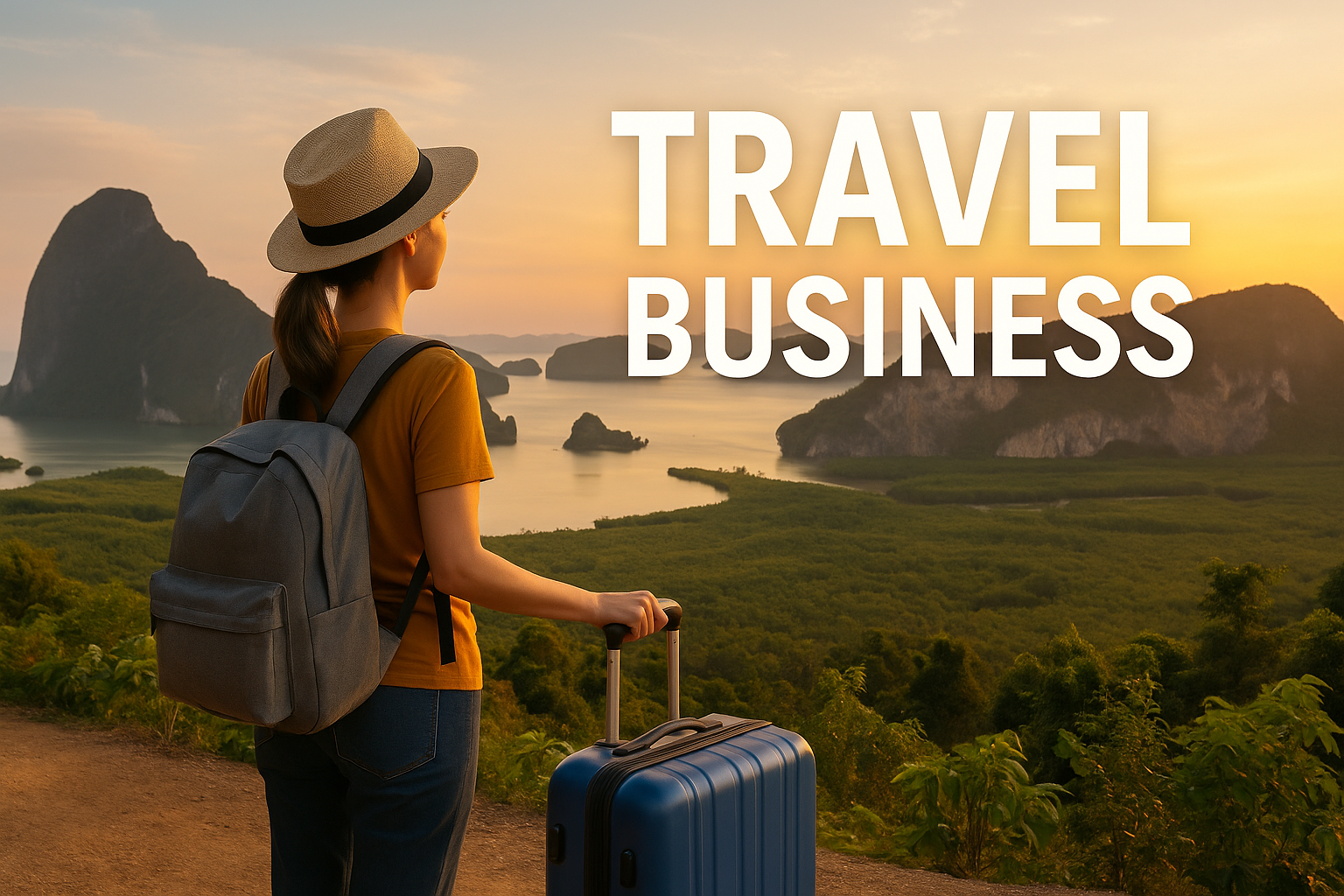- Competitors: Identify other travel agencies, tour operators, or local services in your area. Look at what they offer, pricing, and customer reviews.
- Customer Needs: Understand what travelers in your area need and are willing to pay for. Are they looking for budget trips, luxury getaways, or guided cultural experiences?
- Trends: Stay updated with the latest travel trends like sustainable tourism, wellness retreats, or digital nomad-friendly services.
4 easy steps to PAN Application
-
Fill up the Form.
-
Submit the documents.
-
Pay only professional fee.
-
Get your PAN Application.
PROCESS OF STARTING A TRAVELLING BUSINESS
-
Decide the Type of Travel Business
choose the type of Travel Business you want dive in (for e.g. A Travel Agency Business, A tour operator business, An Adventure Travel Business, An Event-Based Travel Business etc.)
-
Conduct Market Research
- Identify Target Customers: Families, solo travelers, corporates, students, NRIs.
- Study Competitors: Analyze existing travel agencies & tour operators.
- Understand Seasonal Demand: Peak seasons (summer, winter, festive seasons).
- Popular Destinations: Domestic (Goa, Kerala, Rajasthan, Himachal) & international (Dubai, Thailand, Singapore, Europe).
-
Choose Your Business Model
- Online Travel Agency (OTA): Website & app-based bookings.
- Offline Travel Agency: Physical office for ticketing & bookings.
- Hybrid Model: Combination of online and offline services.
-
Register Your Business & Get Licenses
- Business Registration: Register as Sole Proprietorship, LLP, or Private Limited Company.
- GST Registration, Trade License, IATA Certification, Tourism Board Approval, FSSAI License, Adventure Tourism Certification, IRCTC License, Adventure Tourism Certification etc.
-
Secure Investment & Funding
- Self-Funding: Personal savings or family investment.
- Bank Loans & MSME Loans: Mudra loans for small businesses.
- Angel Investors (For Online Travel Startups): If launching an online portal.
-
Set Up Office & Digital Infrastructure
- Office Space: A physical location for customer walk-ins (if offline).
- Website & Booking System: A user-friendly website for online bookings.
- Mobile App & CRM Software For ease of access and customer database.
-
Partner and Collaboration
- Hotels & Resorts: Partner with budget to luxury hotels.
- Airlines & Train Services: Get commission-based deals for flight & railway ticketing.
- Local Transport & Tour Guides: Partner with taxi services & local guides.
-
Hire & Train Staff
- Travel Consultants: Experts in itinerary planning & customer service.
- Sales Executives: Handle bookings and tour inquiries.
- Tour Guides & Operators: For package tours.
-
Marketing & Promotion
- Online Presence: Create a website, list on Google My Business.
- Online & Offline Promotions: Run ads on Facebook, Instagram, Google, Start a YouTube Channel for travel vlogs & promotions. Distribute brochures & pamphlets & give Discounts.
- Collaborations: Collaborate with corporates, schools & universities for group travel.

TYPES OF TRAVELLING BUSINESS
TRAVEL AGENCY BUSINESS
A “Travel Agency Business” is a type of travel business that acts as a retail intermediary, selling travel products like flights, hotels, and tours to customers on behalf of various travel suppliers like airlines, accommodation providers, and tour operators, essentially connecting travelers with the services they need to plan their trips; they function as a middleman between the customer and the service providers, earning commission on each sale.
TOUR OPERATOR BUSINESS
A tour operator business is a type of travel business that specializes in creating and selling packaged tours, combining various travel components like accommodation, transportation, meals, and sightseeing activities into a single itinerary, essentially taking care of all the arrangements for a traveler’s trip to a specific destination, often marketed through brochures and sold directly to the public or through travel agents.
ADVENTURE TRAVEL BUSINESS
An “Adventure Travel Business” is a type of travel company that specializes in providing unique and often physically challenging experiences for travelers, typically involving outdoor activities like hiking, kayaking, mountaineering, river rafting, diving, or wildlife safaris, often in remote locations, with a focus on immersing themselves in nature and local cultures while engaging in activities that may require a degree of physical exertion and sometimes specialized skills; essentially, it’s a travel business centered around “adventure” experiences rather than standard sightseeing tours.
RELIGIOUS AND PILGRIMAGE TOUR BUSINESS
A “Religious and Pilgrimage Tour Business” is a specialized travel agency that caters to individuals seeking to visit sacred sites and participate in religious activities at destinations considered holy or significant to their faith, often involving travel to participate in religious festivals, rituals, or simply to experience the spiritual atmosphere of a particular place, with a focus on providing culturally sensitive and respectful experiences for pilgrims while navigating the unique needs and customs of different religious traditions; essentially, it’s a niche tourism sector focused on facilitating spiritual journeys for individuals seeking to deepen their religious connection through travel.
EDUCATIONAL & STUDENT TRAVEL BUSINESS
An “Educational & Student Travel Business” within the broader travel industry specializes in designing and facilitating trips specifically catered to students of all ages, with a primary focus on educational experiences that go beyond traditional classroom learning, often incorporating cultural immersion, site visits, workshops, and interactions with local experts, all while managing the logistics of group travel for schools and educational institutions; essentially, it’s a niche travel agency that prioritizes learning and development alongside the travel experience itself.
EVENT-BASED TRAVEL BUSINESS
An “Event-Based Travel Business” within the broader travel industry focuses on designing and selling travel packages specifically centered around attending large-scale events like conferences, festivals, sporting competitions, concerts, or conventions, where the event itself is the primary draw for travelers, and the travel business handles all aspects of getting attendees to and accommodated at the event location, often including additional experiences like sightseeing or social gatherings around the event dates.
REQUIREMENTS OF TRAVELLING BUSINESS
RESEARCH THE MARKET
CREATE A BUSINESS PLAN
- Executive Summary: Outline your business concept and goals.
- Services Offered: Clearly describe the travel services you will offer (tours, transportation, booking, etc.).
- Target Market: Define the demographic and geographic areas you plan to serve (e.g., young travelers, families, business travelers, etc.).
- Marketing Strategy: How will you promote your services? Consider online marketing, partnerships with hotels or local businesses, and social media.
- Revenue Model: Will you charge a flat fee for services, earn commissions from bookings, or create packages?
- Financial Plan: Estimate startup costs, operational costs, pricing structure, and expected revenue.
BUILD PARTNERSHIPS
- Local Suppliers: Partner with hotels, restaurants, transportation providers, and local guides to offer comprehensive packages.
- Travel Platforms: Register your services on platforms like TripAdvisor, Airbnb Experiences, or Viator to reach a wider audience.
- Travel Insurance Providers: Work with insurance companies to offer travel protection plans to clients.
SET UP SOCIAL MEDIA & MARKETING
- Social Media Presence: Create accounts on Instagram, Facebook, Pinterest, and YouTube to showcase travel destinations, customer experiences, and promotional offers.
- Content Marketing: Start a blog or YouTube channel about travel tips, destination guides, or cultural insights. This helps attract organic traffic to your site.
- Collaborations: Partner with influencers, bloggers, or YouTubers in the travel niche for exposure.
- Email Marketing: Build an email list to send out newsletters, promotions, and travel tips to keep clients engaged.
DEVELOP YOUR PACKAGES & SERVICES
- Tour Packages: Create various travel packages that fit different budgets, such as luxury tours, budget-friendly vacations, or adventure trips.
- Custom Packages: Offer personalized travel itineraries where clients can choose destinations, activities, and accommodations according to their preferences.
- Group and Corporate Travel: Tailor packages for corporate retreats, team-building events, or group travel.
CUSTOMER SUPPORT & SERVICE
- Responsive Communication: Be available to respond to inquiries and provide excellent customer service via email, phone, or live chat.
- Feedback: Ask clients for feedback and reviews after their travels to improve services and build trust.
- Loyalty Programs: Consider offering rewards, discounts, or special deals for returning clients or referrals.
LAUNCH AND PROMOTE YOUR BUSINESS
- Grand Opening Offers: Consider running promotions or offering discounts for your first customers.
- Networking: Attend local business networking events, tourism fairs, or travel conferences to build connections with potential clients and other businesses.
- Referrals: Encourage satisfied customers to refer friends and family by offering incentives like discounts or free services for referrals.
EXPAND YOUR OFFERINGS
- As your business grows, consider expanding your services. You could offer travel insurance, souvenirs, or luxury add-ons like private chefs or guided excursions.
- Stay informed on travel trends and adapt your business accordingly. For example, if you notice an increase in sustainable tourism, start offering eco-friendly travel options.
DOCUMENTS FOR TRAVELLING BUSINESS
IATA CERTIFICATE
IATA Certificate for a travel business signifies a formal certification granted by the International Air Transport Association (IATA), allowing a travel agency to sell airline tickets on behalf of participating airlines, access global airline inventory, and utilize the IATA Billing and Settlement Plan (BSP) for streamlined invoicing and payment processing this certification enabling them to directly access airline ticketing systems and sell tickets to customers with a single sales agency agreement, ultimately simplifying their business relationship with airlines and enhancing customer service.
TRADE LICENSE
A “Trade License for a Travel Business” is a legal document issued by the local municipal corporation, permitting a company to operate as a travel agent within a specific jurisdiction, signifying that they comply with local regulations and are authorized to provide travel services like booking flights, hotels, and tour packages to clients, while adhering to set industry standards and legal requirements; essentially allowing them to conduct business as a travel agency within the designated area.
SHOP & ESTABLISHMENT ACT REGISTRATION
A “Shop & Establishment Act Registration” for a travel business Required If running a physical office. registering your travel agency under the state’s Shop and Establishment Act, which essentially requires you to provide details about your business operations, including address, ownership, employee count, and nature of services, to the local labor department to legally operate as a commercial establishment and comply with labor regulations related to working hours and employee welfare.
GST REGISTRATION
Both tour operators and travel agents are required to register for GST if their turnover exceeds specific thresholds. For tour operators, the threshold is Rs. 20 lakhs, while for travel agents, it’s Rs. 10 lakhs.
VISA CONSULTANCY LICENSE
A visa consultancy license for a travel business allows a company to help clients with their visa applications. This includes helping clients understand visa requirements, gathering documents, and filling out applications.
TOURIST PERMIT
A Tourist Permit for travel business is a permit that allows commercial vehicles to transport tourists and their luggage across India. It’s issued by the Regional Transport Office (RTO).
IRCTC LICENSE
An IRCTC License, essentially an “Authorized Agent” status with the Indian Railway Catering and Tourism Corporation (IRCTC), allows a travel business to book train tickets directly through the IRCTC platform, enabling them to sell train tickets to customers and earn a commission on each booking; this essentially means they can operate as a licensed travel agent specializing in Indian railway travel, with access to bulk booking features and exclusive benefits like faster ticket access and customer support.
TAAI MEMBERSHIP
TAAI (Travel Agents Association of India) membership, for businesses in the travel and tourism industry, signifies a commitment to professionalism, ethical standards, and industry development, offering benefits like professional training, networking opportunities, and advocacy for member interests.
MINISTRY OF TOURISM APPROVAL
The Ministry of Tourism Approval for a travel business in India signifies a voluntary recognition granted by the Indian government to travel agents, tour operators, adventure tour operators, and tourist transport operators, aiming to promote high quality standards and services within the tourism industry by encouraging them to operate under a recognized framework; essentially, it’s a way for travel companies to demonstrate their credibility and commitment to quality tourism practices, allowing them to be listed as approved by the Ministry of Tourism.
ADVENTURE TOURISM CERTIFICATION
An “Adventure Tourism Certification” for a travel business signifies a recognized standard that verifies a company adheres to safety protocols, environmental sustainability practices, and responsible operations when providing adventure activities like trekking, rafting, mountaineering, or wildlife safaris, ensuring a high quality and secure experience for clients while minimizing impact on the local environment and community; typically obtained through a recognized governing body or tourism board, often requiring specific training for guides, adherence to safety regulations, and demonstrated commitment to responsible tourism practices.
ECO-TOURISM CERTIFICATION
Eco-Tourism Certification for a travel business is a recognized accreditation that verifies a company’s commitment to sustainable practices, environmental conservation, and the well-being of local communities within the natural areas they operate in, essentially signifying that their tourism activities minimize negative impacts on the environment while maximizing positive benefits for local people and the ecosystem. his certification is achieved by undergoing a rigorous evaluation process conducted by a third-party organization.
FOREIGN EXCHANGE LICENSE
A Foreign Exchange License, specifically referred to as a “Full Fledged Money Changer (FFMC) License,” is a mandatory permit issued by the Reserve Bank of India (RBI) that allows a travel business to legally buy and sell foreign currencies to their clients, essentially enabling them to facilitate currency exchange transactions for individuals traveling overseas for personal or business purposes; this license is crucial for any travel agency that wants to provide foreign exchange services to their customers within India.
Why us
Recognized by Govt. of India
End-to-End Financial & Compliance Solutions
ISO Certified
Data Security & Confidentiality
Trained & Professional Team
On Time, Every Time - We Respect Deadlines
Technology Driven
Transparent & Ethical Practices
Support for Startups & MSMEs
Compare with other Travelling Business
Pick a Business Structure That Works Best For Your Business
- Initial Investment
- Profit Margin
- Space Requirement
- Technical Knowledge
- Licensing & Regulations
- Manpower Requirement
- Market Demand
- Break-even Period
- Scalability
- Competition Level
- Risk Factors
Here are some Frequently Asked Questions about travelling business
What are the initial costs involved in starting a travel business?
- Registration & Licensing: ₹10,000 – ₹50,000
- Website & App Development: ₹50,000 – ₹2 lakh
- Marketing & Branding: ₹30,000 – ₹1 lakh
- Office Space (if required): ₹10,000 – ₹50,000 per month
- Staff Salaries (if applicable): ₹20,000 – ₹1 lakh
- Working Capital (for bookings & operations): ₹1 lakh – ₹5 lakh
What are the best ways to earn money in a travel business?
- Service charges on tour packages
- Commission from airlines, hotels, and transport providers
- Selling travel insurance
- Customized premium tours
- Affiliate marketing on travel blogs
- Visa processing and documentation services
How can I manage bookings and customer data efficiently?
- Use travel CRM software like TBO Holidays, TravelCarma, or Amadeus
- Automate bookings through a website or mobile app
- Maintain a database of customer preferences for personalized offers
What are the challenges in the travel business?
- Seasonal demand fluctuations
- High competition from established players
- Refund and cancellation disputes
- Changing government regulations and visa policies
- Dependence on third-party services (airlines, hotels)
What is the best location to start a travel business in India?
- Metro cities: Delhi, Mumbai, Bangalore, Chennai (for corporate and international travel)
- Tourist hotspots: Jaipur, Goa, Kerala, Manali, Rishikesh, Varanasi
- Pilgrimage destinations: Haridwar, Tirupati, Vaishno Devi, Shirdi
Leave Your Accounting to Us and File GST Accurately.
Save time, money, and taxes with our AI based Business softwares and expert accountants.
















